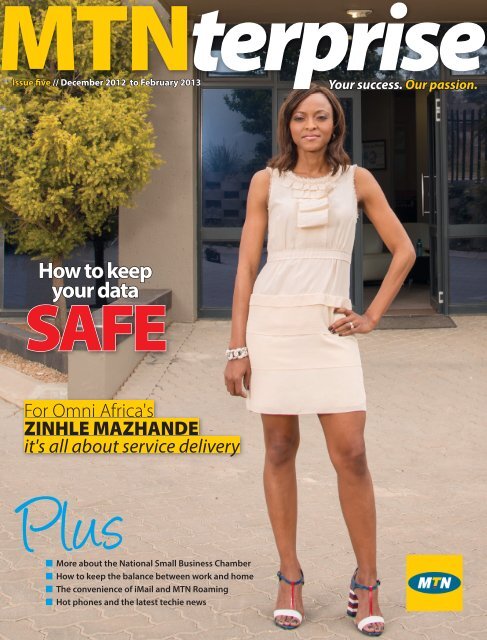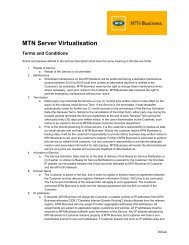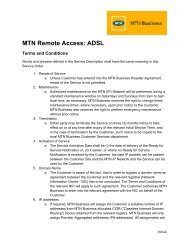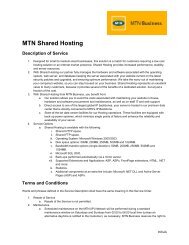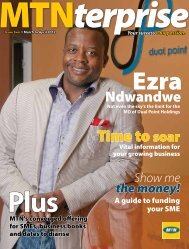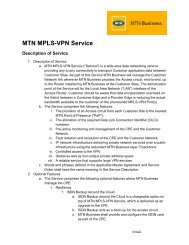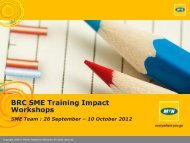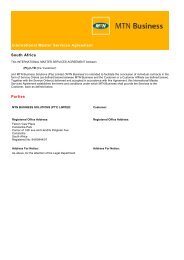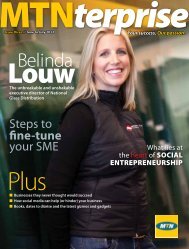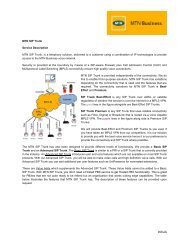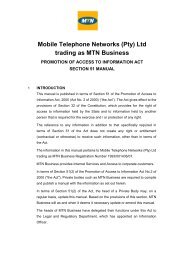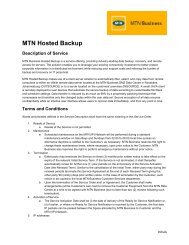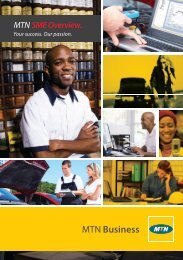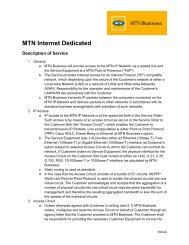Y'ello - MTN Business
Y'ello - MTN Business
Y'ello - MTN Business
- No tags were found...
You also want an ePaper? Increase the reach of your titles
YUMPU automatically turns print PDFs into web optimized ePapers that Google loves.
WELCOMEY’ello"We're proud ofentrepreneurs who havetaken up the challengeand done so much to placeSMEs on the map of SouthAfrican businessesWelcome to the fifth issue of <strong>MTN</strong>terprise. As the yeardraws to a close, I am sure many of you are lookingforward to having a break. Whether you decide to'close shop' for a couple of weeks or are planning along weekend away, it's important that you leave yourbusiness with peace of mind. This might mean leavingsomeone reliable in charge or making sureyour premises and important data are safe.In this issue, we have highlighted two importantaspects of running a small business. The first is securingyour data against online threats. At <strong>MTN</strong> we knowhow important it is to have secure systems, and in thisissue we feature some surefire ways of securing yourimportant and/or sensitive business information frompredators. The second is making sure you maintaina good balance between your work and your homelife. It's so easy to put everything into running yourbusiness, especially in the beginning. But we're hereto remind you that while it's important to love whatyou do, it's equally important to spend time with yourloved ones, as well as take care of yourself so you don'tburn out.We also spoke to Omni Africa's financial manager,Zinhle Mazhande, and found a dynamic lady whois dedicated to the job. We're immensely proud ofentrepreneurs like Zinhle who have taken up thechallenge and done so much to place SMEs on themap of South African business.We wish you all a safe and happy festive season!Eleanor MitrovitchGeneral Manager: Branded Channel<strong>MTN</strong> SAWe would love to hear from you. Please email your letters and comments to <strong>MTN</strong>terprise to sme-mag@mtn.co.za2
PRODUCTWith insight on your side<strong>MTN</strong>'s InsightPlus is a valuable management tool for your portable and telecommunications assetsAs an SME owner, managing your portable and telecommunicationassets (such as data cards and mobile phones) andreducing your overall expenditure can be a challenging partof your business. But it's a necessary one. In an environmentof strong dependance on employer-supplied portableassets, businesses are facing increasing expenditure andassociated risks.<strong>MTN</strong> InsightPlus provides a unique finance tool that allowsbusinesses to manage a range of portable assets –it gives you the power to control portable assets, reducingadministration and processing costs by up to 75%. It alsoprovides visibility across your organisation's entire fleet ofportable assets.<strong>MTN</strong> InsightPlus is a simple-to-use web-based system thatallows business owners to view, analyse and reporton portable-asset data through a standard web browser.The product allows businesses to establish usagepolicies within the system and automatically apply themacross the organisation's fleet of assets. So it becomes avaluable tool to identify any misuse or non-active accountsacross the business.The system can interface with your business' financialpackage to ensure the right charges are allocated to theright cost centre. Personal-cost allocation can be integratedinto the system through a payroll interface to make personalpayments simple and effective. InsightPlus providesorganisations with an option to email these reports toexecutive management and users.In addition, <strong>MTN</strong> InsightPlus offers:• Identification of non-business transactions• Management of additions, moves and changes to thefleet of users, assets and services• Identification of assets that are not being used toeliminate unnecessary expenditure• Analysis of data across the business, including costcentres, individual users and business users.To benefit from this comprehensive administration andfinancial tool, call 083 1 809, go to mtn.co.za or visit an<strong>MTN</strong> store for assistance.3
UP CLOSEfinance as larger corporates, which can hamper their abilityto compete for and deliver on a tender specification or closea deal in a specific timeframe. ’<strong>MTN</strong> has existing proceduresin place that help and empower SMEs. We appreciate theirunderstanding and respect for our business and the fact thatwe consistently receive good service from them. There havebeen no networking issues or problems with phone linesgoing down,’ says Zinhle.Omni Africa’s clients range from listed companies,multinationals and financial institutions to parastatals, NGOsand foreign clients that are serviced from the South Africanbranch. Their common denominator is a business-reportingrequirement that creates the need to purchase new andupgrade existing accounting packages that may be drawnfrom the Sage Pastel stable.’The pursuit of superior performance and customersatisfaction infuses every Omni Africa activity. That’s whywe operate successfully in Africa,’ says Zinhle. ’Where thepotential for doing business exists, but cash flow is stifled,we must be tenacious and conscientious about findingworkable solutions for our clients that don’t impact ourown liquidity.’In short, that translates into not making ’stupiddecisions… and ensuring that your margins are goodenough to allow you to cover basic costs like overheads andsalaries, so that you can afford to manoeuvre in a difficultmarket,’ she continues.Omni Africa demonstrates market leadership throughenhanced customer service, inspired management and theapplication of best practices throughout the organisation.The software sell is determined by the size of their client’sbusiness and the extent of their day-to-day reportingsystems. On further investigation of their operational needs,Omni Africa can determine whether that software needs tobe accessed via a server, a network, a desktop computer or alaptop. That leads to enquiries around appropriate hardwareas well as training. ’This gives us the extra edge and helpsus deliver on our offering as efficiently as we would like to,’explains Zinhle.The training is offered externally to Omni Africa’s clients,as well as free to all internal staff to enable them to brush upon soft skills and technical skills on an ongoing basis.Omni Africa is now an accredited partner of Sage Alchemex.’It’s a good fit for us. We offer Excel ABC, which covers thevery basics of the programme, Excel for Auditors and Excelon Steroids, which is the most advanced package. I alsocompleted the training so that I can offer it myself,’ says Zinhle.As for being 100% black-owned, she reiterates that ’mostlywhat gets us ahead is our credentials, our track record inservice delivery. We focus on that more than on our BEEstatus, and that goes for our clients and suppliers too.’For more information, visit www.omni4africa.comPhotographs: Jason Robinson/Bird on a Wire, Hair and Make-up: Lindsay Swart/Red Hot Ops10
SECURITYImage: Shutterstock.com"What makes SMEs especiallyvulnerable is the smallness oftheir resource base as well as thesimplicity of how they operateare advanced computers in their own right, and as such arethemselves not immune to viruses and other cyber-threats.’Nowadays almost everyone runs a business on some typeof IT system, which means that the IT and business risks areintertwined. What we at <strong>MTN</strong> do is work comprehensively toreduce the business risks that SMEs face.’This leads to the next essential step. Take sensible measuresto protect yourself. In this regard, <strong>MTN</strong> and its team of certifiedIT-security experts offer participating customers a host ofsolutions for ensuring the confidentiality and integrity of theirdigital assets. ’We have a multi-pronged arsenal that we deployto make sure businesses keep their data safe,’ Adrian says.One example is <strong>MTN</strong> Managed Firewall. A firewall is acollective term for a set of resources that guard a systemagainst incursion by unwanted or unauthorised outsiders.Customers who are linked to <strong>MTN</strong>’s data centre can custombuildthese defences according to their own company rules.For instance, if the specifications don’t allow peer-to-peernetworking (P2P), the firewall intelligently recognises whenthis is attempted and immediately blocks it.In layman’s language, the danger in this case is that P2Penables one or more computers to look into and manipulatethe innards of another – which is great for sharing files with acolleague down the hall, but not so great when the guest is arobotic agent (or ’bot’) sniffing out your goods on behalf of anameless cabal on the other side of the planet.The odds are excellent that the bot will implant a program inyour system and that it in turn will ’phone home’ to a control programon the Internet to announce the coast is clear for invasion.The next thing you know (or don’t), a plug-in will be installedin your web browser, say, to record the keystrokes you performwhen logging in to an online bank account; alternatively, yourbandwidth could be hijacked to enable a third party to callpremium phone numbers at your expense.Another security solution is the Mobile Device Management(MDM) initiative, a customised service that consists ofa range of separate products offered by <strong>MTN</strong>. As its nameimplies, MDM is geared towards mobile devices, and althoughthe service covers more than IT security alone, it’s thekey service to remember when it comes to protecting yourbusiness-use smartphones from viruses.For situations where you use a laptop in conjunction with3G-connectivity, <strong>MTN</strong> provides a suite of well-known antivirusproducts. These are mainstays of IT security, and Adrian addsthat you should ensure the licences are up to date and notforget to include USB flash drives in routine scans.However, the problem with using conventional antivirusproducts on cellphones is that it chews up resources and’reduces the devices’ usability’. This is where MDM comes tothe fore: the action all happens on the Internet cloud. ’Weperform antivirus scanning not on the device itself but on themobile device management platform,’ Adrian says. ’The scansare also run at specific times, like when the phone is charging,so that there won’t be a decrease in the battery life.’In addition to firewalls and antivirus software, you shouldrun email-scanning software such as <strong>MTN</strong> Internet ManagedScanning, which deploys various email-security services to protectSMEs. Given that about 70% of malware originates fromwebsites, it’s also recommended that you activate a web advisoryservice. These are standard with most security suites andwarn you when you’re about to access a virus-riddled website.As Adrian explains, this compendium of solutions isdetection-based: threats are identified, then neutralised insome fashion. The best defence, though, is prevention – inother words, sealing up the vulnerabilities in your IT system.This is done by ensuring that your operating system (as wellas other software) is continually updated, because the updatescontain ’patches’, or repair jobs, which manufacturers issue asand when they discover vulnerabilities in their products. Don’tignore those annoying pop-ups that say, ’Updates are ready toinstall’, and don’t postpone the updates either: they’re vital toyour digital wellbeing… but note that if you’re running piratedcopies, you won’t be entitled to them.It almost goes without saying that data should be regularlybacked up and stored safely. One SME owner stores externalhard drives in a bank vault, but this extreme is unnecessaryas the cloud provides a formidably secure – and moreconvenient – place of sanctuary. Ideally, data stored on thecloud should be encrypted. In addition, change the passwordregularly, and make it a tough nut to crack by combiningalphabetical and non-alphabetical keys.Cyber-threats are a sophisticated reality. While it’s unwise to becomplacent, it’s just as unwise to give in to out-and-out paranoia.All that’s required is to keep IT security on your business agendaand implement an appropriate level of safeguards. As Adrianputs it, ’A minimum number of precautions should be in place,and once that’s done, the technology can be restored to beingthe productive and immensely useful tool that it is.’For more information, visit www.mtnbusiness.com or yourlocal <strong>MTN</strong> retailer.13
LIFESTYLEMaking it workWhen you run your own business, creating a balance between work and the rest of your life can bechallenging. Here are some vital tips and tools to help you with the juggling act. By RIEKIE HUMANStarting blocksEvery entrepreneur out there will tell you that when theystarted out with their business, they were tempted to go toobig, too fast. And although that’s only natural, it can cost youdearly down the line – especially in terms of your health andfamily life. Apart from being very measured in your approach,the key to keeping things within your control should be toinstall stringent processes right from the get-go. ’Initially, yourmain priority will inevitably be to get customers, but as yourcompany grows, don’t forget to put some processes in placeand streamline the operational aspects of your business,’ saysPenny Holburn, a life and leadership coach from Johannesburg.She adds that it’s crucial to set specific goals – such asacquiring at least one new customer contact per day, orattending two networking events a month. This allows for thekind of structure where, once you’ve reached (achievable) goals,you’re ’allowed’ to take time out from work and focus on the restof your life. Without parameters like these, you’ll feel obliged toattend any and every networking opportunity, and you’ll seeevery person you encounter as a potential client whom you haveto win over. In the long run, this is a recipe for burning out!What’s more, expanding your business too quickly will alsogobble up any spare time you have and seriously affect yourfamily life and health. ’Rather get one product or service lineright first, and then add on to it gradually,’ says Penny.It’s also critical to keep the bigger picture in mind, asKarike Conradie – owner of Kikka florist and restaurant in theWestern Cape – believes: ’Work is not everything. There areother things in life that are more important. Time with yourchildren and family and your health. Ask yourself if you cankeep up this kind of living for five or more years and still havesomething left in your life that makes you tick after that.’Support systemsRemember that it’s pivotal to surround yourself with peoplewho support your venture, says Penny, and points out thatyou’re going to be tired and stressed, so you won’t need peoplearound you telling you that you can’t do it. Karike says she’sbeen extremely fortunate: ’I’ m lucky to have a good supportsystem. Our staff members are amazing and have been with usfor a long time; my husband is with me in the business; and myparents and family are very involved in our lives. We also have afantastic nanny for our kids [aged three and five].’Another invaluable support stream could come frommentors, and Penny suggests making contact with other SMEowners. ’ People’s attitudes and emotions are contagious –you think like and act like the people with whom you spend alot of time. So find a mentor who has done what you want todo. Make contact with people who are specialists in variousfields such as law, accounting, company structure, HR and tax.And ask when you need help and advice – the more you ask,the more you’re able to learn and grow,’ she advises.Plan, plan, planPlanning takes time but in the long run it also saves you time.As Penny says: ’Failure to plan is planning to fail.’Cai Langhans, owner of LICHT LED Lighting Solutions,agrees. ’It can be near impossible to keep the balancein the first years of starting your business. However, youshould always be conscious about the importance of goodtime management.’ He also can’t stress the importance ofdelegating enough: ’Don’t think you’re the only person whocan get things done, and try to organise your tasks better.’Karike points out that having staff comes with its ownstresses, but they do also help to take it away. ’We haveto take each others’ situations into account. With 15 staffmembers, things can get a bit hectic. But then at unexpectedtimes, everybody slots into action and you get a nice breatherwhen the ship sails smoothly. It makes it all worth it.’She also says that it’s important to decide on time off, andstick to it. ’We close annually between Christmas and NewYear, on Easter weekend and every Sunday. We made that"People’s attitudes andemotions are contagious – youthink like and act like the peopleyou spend a lot of time with16
decision at the beginning. It’s important for us and our staffto be at home during special family times – as this giveseverybody at least some time to recharge their batteries.’Perfectly balancedThere really is no way around it: You need to have some timeoff. ’Nonstop working just compromises the quality of yourwork and your ideas,’ says Penny. ’Most coaches recommendyou take at least one day off a week. If you’re working morethan 60 hours a week month after month, it’s too much.’Cai believes you should rather compromise on your incomethan on your health. ’You should start delegating as soon aspossible, even if it has an impact on your balance sheet. Yourhealth is the foundation of your business, so you really needto prioritise it.’Penny advises that you should try to make time to exerciseat least two or three times a week, for at least half an hour at atime. ’When you’re physically fit, you’re also able to do more,so it’s a win-win situation.Family firstThink about it – one of the main reasons you work is to beable to support your family. But there’s no point going to suchextremes that you never get to enjoy time with them. Pennyoffers the following advice:n Prepare your family for the hours you’ll be working:If they know upfront that they won’t see you becauseyou’re getting a business together, they’ll be a lot moreunderstanding than if you don’t tell them anything.n Set aside family time: Spend some time, even if it’s onlyfour hours, each week with your family – and make it count.For those four hours, don’t let work come into the picture atall. That means no phone calls or emails.’Karika's husband, Abe, who owns AB Products, whichproduces flavoured mayonnaises and balsamic reductions,agrees,’ Our children are more precious than anything.I can’t turn the clock back once they’re in their teens or older.They’re my biggest investment and require my time andaffection now!’A final word of advice from Penny is that in order tokeep the balance, you really need to like what you do, orelse you’re bound to spend more and more time trying toturn it into something enjoyable. ’ Love what you do. Nomatter how brilliant you are, how right your business idea is,you will be tested and you will have tough times.’Abe believes one should invest in what’s significant.’Yes, business, profitability and money are vital to functionin the world, but faith, family and friends are even moreimportant. I try to think of the eternal value of mydecisions.’17
DID YOUKNOW?ga ra getheFromElizabeth Zambonini (left), CEO and founder ofThe Hope Factory, with Deputy CEO Annie McWalterFor the founders of some of the world’s most successful businesses, garageshave offered far more than just storage space or vehicle protection. Instead,they have provided the space to plant the seeds of successYoung entrepreneurs in the computer roomLearners at The Hope Factory'sAnnual Stakeholder Appreciation DayMbongeni Jawa of Entwine Instinct TextilesThe Chinese philosopher Lao Tzuonce said: A journey of a thousandmiles begins with a single step. Andin the case of a number of successfulbusinesses – both local and international –that first step was taken from the interior of alowly garage.A case in point is The Hope Factory (THF),a local non-profit initiative that aims to‘develop, equip and support previouslydisadvantaged South Africans to establishand grow their businesses’.The brainchild of Elizabeth Zambonini, TheHope Factory began as a mini-enterprise in aCape Town garage in 2001, with resources solimited that even finding the money to buytoilet paper was initially a struggle. ‘In thatgarage were myself, Marion, two volunteers,and the first 10 learners,’ recalls Liz. ‘Every rainyCape Town winter’s night we had to pack upall the sewing machines and equipment intomy little Golf, and transport them tomy parents’ house, unpack it, climb over it,go to sleep and then repack it all the nextday.’ The turnover generated in that first yearwas a mere R12 000, barely allowing THF tobreak even.Several months later, THF graduated fromthe garage to a dilapidated old house, wherethey continued to fine-tune their curriculumand focus on putting the right operational,financial and legal systems in place.The venture’s big break came a couple ofyears later, when The South African Instituteof Chartered Accountants took it under itswing as a corporate social responsibilityproject. With this newfound financialsupport, THF was able to move into a largerproperty, open a sales branch and head officein Johannesburg and later, another branch inPort Elizabeth.Today The Hope Factory is one of SouthAfrica’s leading enterprise-developmentinitiatives, employing more than 50permanent staff and 80 contractors, andtraining roughly 120 entrepreneurs annually.Over the past 11 years, Liz and her colleagueshave helped more than 1000 individualsacquire the business and life skills necessaryto realise their dreams of self-sufficiency, andgrown THF’s annual turnover to a staggeringR15-million. But perhaps the most strikingaspect of the venture – and the true measureof its success – is that 76% of THF graduatesfrom the past five years remain financiallysustainable in the current climate.Other mega-businesses seededin garages:n Walt Disney started The Disney BrosCartoon Studio in the summer of 1923, in hisuncle Robert Disney's garage, located in theLos Feliz neighbourhood of Los Angeles.n Hewlett Packard was founded in 1939 byStanford University students Bill Hewlett andDave Packard, who built their first product –an audio oscillator – in a Palo Alto garage.n Amazon was founded by Jeff Bezos, whostarted it as an online bookstore operatingfrom his Seattle garage in 1994.n Apple Inc was conceived in a Californiagarage workshop in 1976, when Steve Jobsand Steve Wozniak assembled their firstcomputer (a single-board Apple1) there.n Google opened its (remote-controlled)door in 1998, when co-founders Larry Pageand Sergey Brin set up their venture in afriend’s garage, from where they ran thecompany for five months.19


